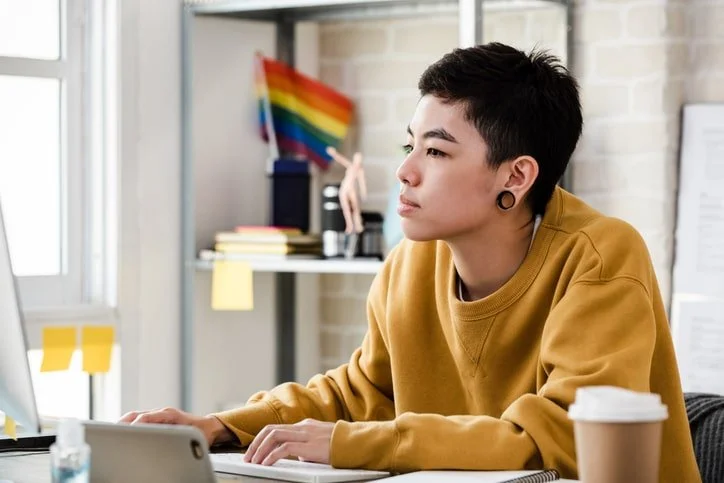Why Anxiety Hits Harder When You’re LGBTQ+ (and How to Cope)
Anxiety Feels Heavy—But Why Does It Hit Harder for LGBTQ+ Folks?
If you’ve ever found yourself lying awake at night replaying conversations, worrying about being accepted, or feeling like your mind just won’t stop, you already know what anxiety feels like. But if you’re LGBTQ+, you may notice your anxiety feels heavier, stickier, or harder to manage than what others describe.
That’s not in your head. Anxiety often shows up more intensely in LGBTQ+ communities—and there are real reasons why.
Let’s unpack why anxiety can hit harder when you’re LGBTQ+ and explore practical tools you can start using today to feel more grounded, safe, and supported.
What Anxiety Really Is
Anxiety is your body’s alarm system. It’s designed to protect you when you’re in danger. Your heart races, your breath shortens, your muscles tense—getting you ready to fight or run.
But when that alarm gets stuck in the “on” position, you feel anxious even when you’re not in immediate danger. For LGBTQ+ folks, that alarm can be triggered more often and more intensely because of the environments and experiences you’ve had to navigate.
Why Anxiety Hits Harder in LGBTQ+ Communities
1. Minority Stress
Minority stress is the extra layer of stress LGBTQ+ people experience on top of everyday life. This can include:
Worrying about discrimination at work or school
Feeling unsafe holding your partner’s hand in public
Having to “code switch” or hide parts of yourself to fit in
This chronic stress keeps your nervous system on high alert—feeding anxiety day after day.
2. Fear of Rejection
Many LGBTQ+ people grow up worrying: “Will my family accept me? Will my friends stick around if they know? Will I lose my job if I’m honest?”
That fear—even if it’s unspoken—creates a constant sense of uncertainty. Anxiety thrives in uncertainty.
3. Trauma and Past Experiences
If you’ve faced bullying, rejection, religious trauma, or violence, your body may still carry those memories. Even if you’re safe now, your nervous system can react as if you’re still under threat.
4. Isolation and Loneliness
Anxiety grows louder when you feel alone. Many LGBTQ+ folks experience disconnection from family or community. Without support, it’s easy to spiral into self-doubt and fear.
5. Internalized Shame
Society sends constant messages—spoken and unspoken—that being LGBTQ+ is “wrong” or “too much.” Over time, those messages can sink in, turning into shame. Shame fuels anxiety with thoughts like: “What if I’m not enough? What if people leave when they know the real me?”
How Anxiety Shows Up for LGBTQ+ Folks
While anxiety symptoms are universal, they can show up differently depending on your lived experience. You might notice:
Hypervigilance in public spaces → scanning to see if it’s safe to be affectionate with your partner.
Overthinking conversations → replaying if you “sounded gay,” “looked too feminine,” or “came off as trans.”
Panic when misgendered or invalidated → because it hits deeper than just a mistake—it threatens your identity.
Exhaustion from masking → constantly managing how much of yourself you show.
Ways to Cope with LGBTQ+ Anxiety
1. Ground Your Body First
When anxiety spikes, your body needs to feel safe before your mind can calm down. Try:
Putting your feet firmly on the floor and noticing the ground beneath you.
Slow breathing: in for 4 counts, out for 6 counts.
Humming or gentle movement to reset your nervous system.
2. Name the Source
Instead of just saying “I’m anxious,” try: “I’m anxious because I’m afraid of being judged in this space.” Naming the source helps your brain separate real danger from past patterns.
3. Challenge the Shame Loop
When internalized shame fuels your anxiety, practice small affirmations:
“Who I am is not wrong.”
“I deserve love and safety.”
“My identity is not a burden.”
Even if you don’t believe it yet, repetition slowly shifts those old patterns.
4. Create Queer Joy on Purpose
Anxiety wants you to focus only on danger. Joy is one way to remind your nervous system that safety exists, too.
Spend time with affirming friends.
Celebrate milestones, no matter how small.
Engage with LGBTQ+ art, music, or stories that inspire you.
5. Set Boundaries with Draining People
If someone constantly dismisses your identity, misgenders you, or makes “jokes” at your expense—it’s not your job to endure it. Boundaries protect your mental health and lower anxiety over time.
6. Seek Affirming Support
Therapy can be life-changing when it’s affirming. A culturally sensitive therapist will help you:
Understand how minority stress impacts you
Build tools to calm your nervous system
Heal shame and trauma tied to identity
Feel fully seen without having to explain yourself
When Anxiety Becomes Too Much to Handle Alone
It might be time to seek help if:
Anxiety keeps you from living your life
You avoid spaces where you’d normally want to be yourself
Your sleep, appetite, or energy are consistently off
You feel hopeless or think you’ll “never get better”
Reaching out doesn’t mean you’re weak—it means you’re ready to take care of yourself.
Anxiety Therapy for LGBTQ+ Folks in Chicago & Illinois
At Mindful Healing Counseling, we know anxiety feels heavier when you’re also carrying identity-based stress. That’s why our therapists provide LGBTQ+ affirming, culturally sensitive therapy online across Chicago and Illinois.
Here, you don’t have to explain yourself. You don’t have to shrink who you are. You just get to show up, breathe, and be supported.
Together, we’ll help you calm your nervous system, manage anxious thoughts, and find moments of peace again.



